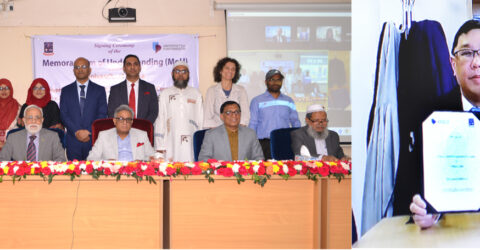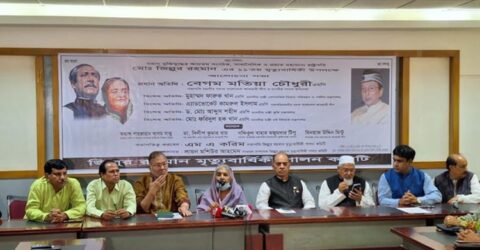
DHAKA, – Prime Minister Sheikh Hasina today said her government is never led by any intention to expose people to torture in custody as she was interviewed by British Broadcasting Corporation (BBC) in London.
“To tell you the truth, our government is never led by any intention to torture people in custody and it (government) also doesn’t do it (either),” she said.
Senior broadcast journalist at BBC World Service Manoshi Barua interviewed the premier when issues of Bangladesh economy, politics and social issues came up in course of discussion as well.
The premier’s comments on the custody issue came as Manoshi asked what steps the present government took to stop such tortures, which the journalist described as a legacy of subsequent governments.
“Incidentally some (one or two incidents) may happen . . . if you see our position in the last 10 years, we rather could take appropriate measures to control crimes,” Sheikh Hasina said.
Barua’s question was Bangladesh had a long history of custodial torture and it did not take place during any specific government and what steps the incumbent government took to overturn the phenomenon.
Shekh Hasina said there are some international rules to interrogate presumed and suspected criminals and her government was training law enforcement agency personnel in that regard sending them in countries like the United States and the UK.
“Information is gathered from the criminals using the methods the other countries practice and nothing is done beyond it,” she said.
The premier said right this moment incidents of custodial deaths appeared very rare the way it happened before while phenomenon of torture in custody also disappeared large.
Sheikh Hasina, however, reminded the BBC journalist that the past regimes virtually developed a culture of impunity and she herself was a victim of that situation after losing her parents, brothers and other near and dear ones in 1975.
“The killers were provided indemnity instead of exposing them to trial . . . that meant you (actually) entertained the culprits,” the premier said adding that it could be very difficult to check crimes in a country where a social system is built by recognising the crimes.
Sheikh Hasina said she had to wait for 35 years to get justice.
Again asked what initiative her government took to stop such culture, Sheikh Hasina said all “appropriate measures in this regard”.
Sheikh Hasina said Father of the Nation Bangabandhu Sheikh Mujibur Rahman was assassinated within three and a half years of independence and this culture continued for many years when military dictators ruled the country directly and often in the guise of politicians.
“This culture continued for years after years and it was a difficult task to bring back the country to a healthy trend . . . we performed that difficult task,” she said.
The prime minister said there a class or section of society still persisted which were spearheading a propaganda on the rights situation while democratic system runs the country.
“They always desperately try to find out our faults . . . as their status become elevated when an unconstitutional or abnormal government or martial law rules the country,” she said.
The premier said she knew that the question was raised in Geneva where Bangladesh law minister and other representatives were present.
“The law minister and others gave reply properly in this regard,” she said.
On a question whether the people are getting the benefits of economic growth, Sheikh Hasina said the people are certainly getting the benefits of the growth.
“Think a little that the country’s poverty rate was over 41 percent in 2005-2006 and the rate has been brought down to 21:04 percent… we could attain this success within 10 years,” she said.
The prime minister said per capita income surged to
about 2000 US dollars from 400/500 dollars and the country achieved 8:1 percent GDP in the last fiscal year.
“When higher growth is achieved, the inflation increases naturally. But we didn’t allow raising inflation and we maintained it at 5.5 or 6 percent,” she said, adding its fruits are reaching to common people very naturally.
About migration of the people, Sheikh Hasina said there is a tendency of the people since the ancient period that they will have to build their fate by moving to other places.
“You cannot link the issue with poverty and it’s a tendency of the people,” she said, mentioning that that her government is providing loan without security to the youths who want to work.
When the interviewer questioned about the “vulnerable situation” in banking sector and loan default culture, the prime minister said the matter is not at the extent as publicised.
The prime minister said the culture of not repaying bank loan was initiated during the rule of military dictators. “Whenever we came to the government, we tried to realise the loans,” she said, adding that if action is not taken always, it will not yield any results.
Sheikh Hasina said special incentives were given in this year’s budget. “Those intending to take loan have been asked to repay within the timeframe, otherwise they won’t be given credit,” she said.
She said the country would not have witnessed such socioeconomic progress and economy would not have been so strong, if the problems were big.
About freedom of work of mass media, Sheikh Hasina said there was only one television channel (Bangladesh Television), one radio and a few newspapers in the country till 1996.
But after coming to power in 1996, she said, the Awami League government made open all things in the private sector.
“There are 44 television channels in the country,” she said, adding that her intention was to generate employments.
She said there is full freedom of work of mass media. “If it doesn’t exist how is a propaganda mixing truth with falsehood being carried out against me and my government?,” she questioned.
The prime minister asked if anybody enjoyed such freedom during the rules of military dictators. “Even it was absent during the regime of Khaleda Zia,” she said.
Sheikh Hasina said many people are saying that there is no freedom of mass media. “But how do they speak if freedom of speech doesn’t exist?”
The prime minister said her government is making strides to maintain a peaceful atmosphere in the country. “If anybody gives provocative speech, will others remain idle? … No, they cannot do it,” she said.
“Security will have to be given to the people first and we’ll have to do whatever necessary for their security,” she asserted.




